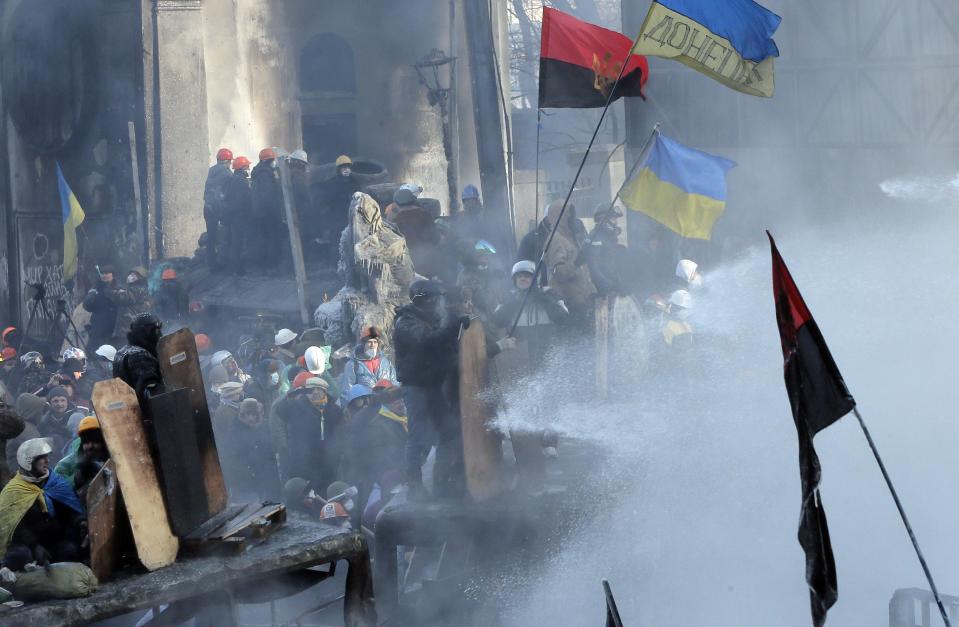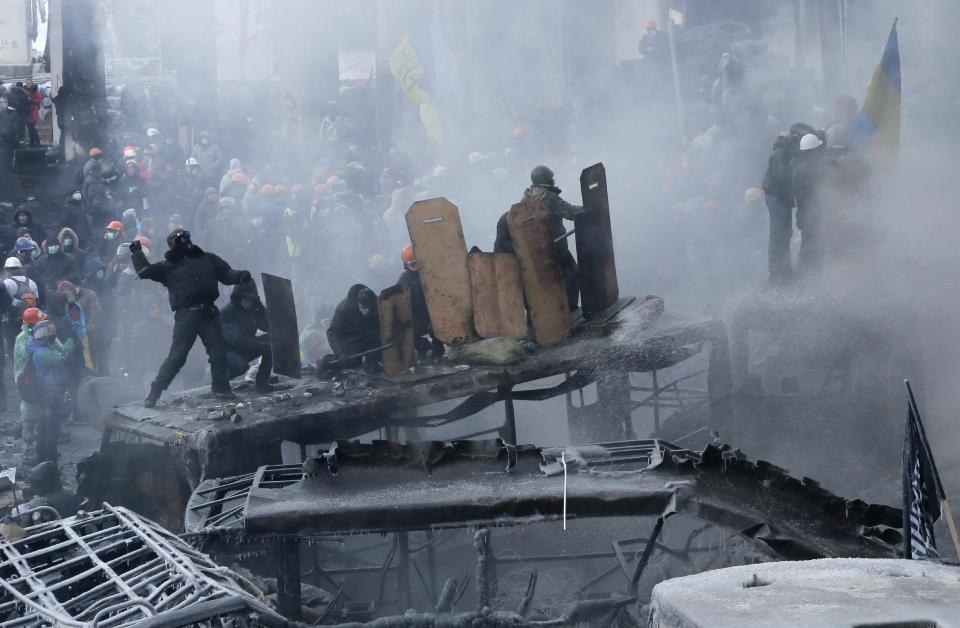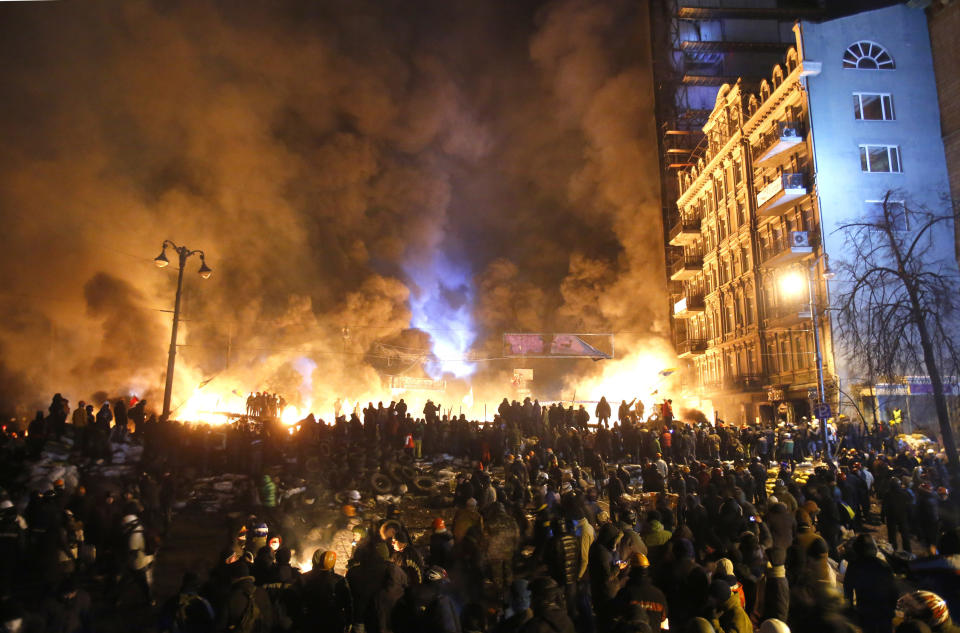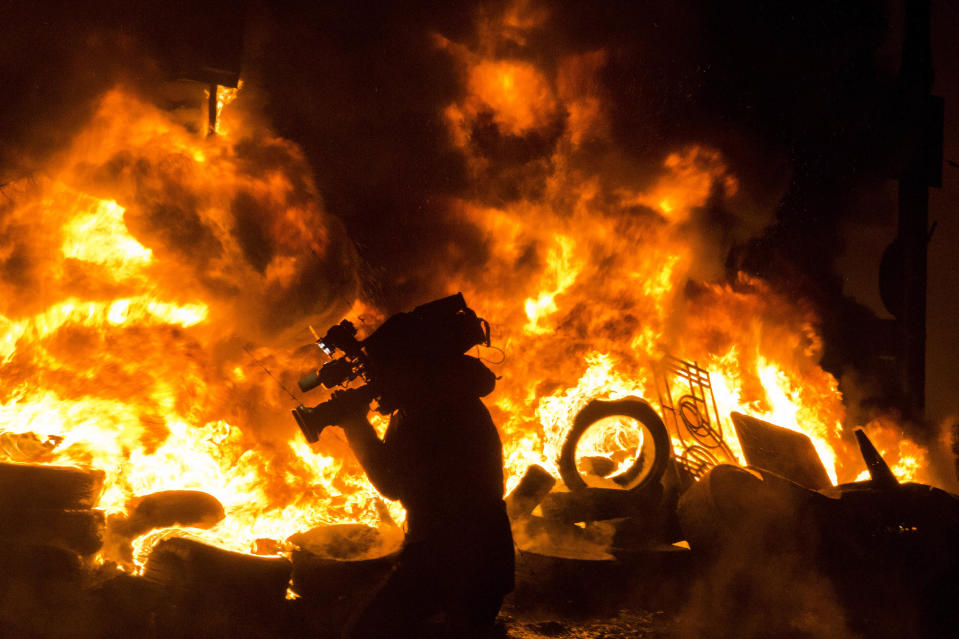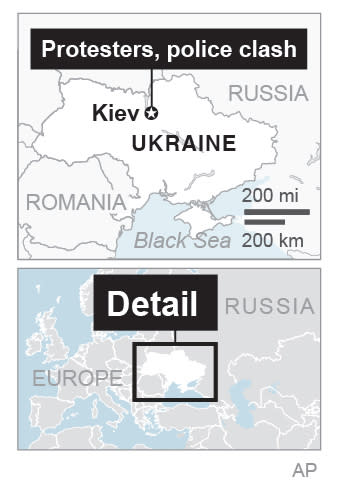Ukraine protester: Gov't accusation is provocation
KIEV, Ukraine (AP) — The Ukrainian government on Saturday ramped up its accusations against protesters, raising fears among the opposition that police are laying the groundwork for a full-scale assault on the demonstrations that have gripped Ukraine's capital for two months.
The head of police accused protesters of torturing two police officers it later released and blamed radical calls for attacks on officers for the death of a policeman whose body was found during the night. He also accused protesters of stockpiling weapons. A protest leader denied the claim of kidnapping, calling it a provocation aimed at justifying a crackdown.
Demonstrations that started in late November to protest President Viktor Yanukovych's decision to shelve an agreement to deepen ties with the European Union had been mostly peaceful until a week ago, when radical factions enraged by new laws to crack down on protests started violent clashes with police.
Three protesters have died in the clashes, two of them from gunshot wounds and a third of unspecified injuries. The Interior Ministry said a policeman was found shot in the head overnight. No arrests have been made or suspects named.
Protesters have rained stones and firebombs on police while officers retaliate with stun grenades and tear gas. On Saturday afternoon, the clash site was tense and black smoke billowed from a barricade of burning tires. Demonstrators milled about, many of them bearing clubs, metal rods and large sticks, but there was no violence.
Protesters seized government buildings in scores of other cities in the European-leaning western part of the country.
Yanukovych was meeting Saturday with three top opposition leaders, who are demanding his resignation. Yanukovych so far has offered only relatively small concessions, but the unrest of the past week could indicate the government is losing control of much of the country.
The interior minister, one of the government figures despised most by protesters said two police officers were released with the help of negotiations by foreign embassies. He said they had been hospitalized, but did not give details of how they allegedly were abused.
Vitaly Zakharchenko earlier said the officers were seized by volunteer security guards at the protest gatherings in Kiev and held in the city hall, which protesters have occupied since December and turned into a makeshift dormitory and operations center.
But the commandant of the corps, Mykhailo Blavatsky, told The Associated Press that no police had been seized.
"The authorities are looking for a pretext to break up the Maidan and creating all kinds of provocations," he said. "Capturing a policeman would only give the authorities reason to go on the attack and we don't need that."
Zakharchenko earlier said a third captured officer had been released and was in serious condition in a hospital.
"We will consider those who remain on the Maidan and in captured buildings to be extremist groups. In the event that danger arises, and radicals go into action, we will be obliged to use force," Zakharchenko said.
In Lviv, where support for Yanukovych is minuscule, regional lawmakers on Saturday voted to establish a parallel government. Although the move was largely symbolic, it demonstrated the strong animosity toward the government in Ukraine's west. Ukrainian politics largely is divided between the Russian-speaking east, which is the industrial heartland, and the Ukrainian-speaking west.
On Saturday, about 100 protesters briefly occupied the headquarters of the energy ministry in downtown Kiev. Minister Eduard Stavitskiy said the country's nuclear energy facilities were placed on high alert.
Andriy Hrytsenko, a well-known opposition figure and former defense minister, was quoted Saturday by the newspaper Ukrainska Pravda as calling for protesters who have legal arms to carry them in self-defense.
"Firearms should be used only in response to threats to human life. I'll be the first to do this," he was quoted as saying.
Yanukovych has called a special parliament session for Tuesday. The session would consider a government reshuffle, amnesty for many of the arrested protesters and changing the harsh new laws cracking down on protests, he said on Friday.
_____
Yuras Karmanau in Kiev and Laura Mills in Lviv contributed to this story.


